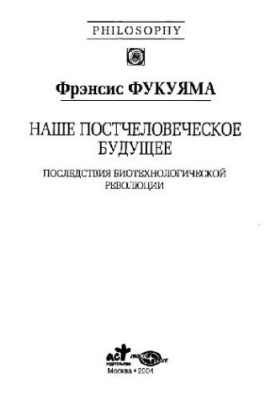Our posthuman future. Consequences of the biotechnology revolution
 Instant download
Instant download
after payment (24/7)
 Wide range of formats
Wide range of formats
(for all gadgets)
 Full book
Full book
(including for Apple and Android)
Our Posthuman Future . Consequences of the Biotechnology Revolution Our Posthuman Future. Consequences of the Biotechnology Revolution Books Historical Author: Francis Fukuyama Year of Publication: 2004 Format: djvu Issue. :AST, Lux Pages: 352 Size: 1. 3 MB ISBN: 5-17-024038-4, 5-9660-0124-3 Language: Russian0 (Votes: 0) Rate:Francis Fukuyama is a Japanese-born American political scientist and publicist. He gained worldwide fame at the turn of the 80s and 90s of the twentieth century, when he published an article, and then a book “the end of history” .. Fukuyama argued that the collapse of the world socialist system at that time meant the end of history in the usual sense, that is, as an endless struggle of alternatives to human development. Ahead - the triumph of the same socio-economic and political model in all countries of the world This thesis of the author immediately began to be criticized, and subsequent events showed that the "post-historical calm" on our planet is still very far away. Nevertheless, Fukuyama generally remains true to his belief in the imminent worldwide triumph of the Western model of social organization. He writes : “The terrorist attacks of September 11 in the United States again raised doubts about the thesis of the end of history. But I personally think , that these events do not prove anything like this - just Islamic radicalism , Behind Them , It is waging desperate rear-guard battles and will be washed away in due time by a wide tide of modernization. But with one statement of his critics, the ideologue of the “end of history” still agrees: “History cannot end as long as the progress of science and technology continues” .. But he also interprets it in his own way .. Scientific and technological progress in its biotechnological dimension in the future will lead to a change in human nature, and therefore, again, the history familiar to us will end and a new, “superhuman” will begin. In his book. Fukuyama compares the two great dystopias of the twentieth century: Orwell’s 1984 and Huxley’s Brave New World. And if, in his opinion, Orwell's totalitarian dystopia failed, then Huxley's visions are more complicated. Here is what the author of the book writes about this: "Many technologies that Huxley foresaw - for example, in vitro fertilization, surrogacy, psychotropic drugs and genetic engineering for the manufacture of children - are already looming on the horizon". That is, the toolkit for implementing Huxley's dystopia is ready. And this dystopia differs from Orwellian in that it is not forced to live like everyone else, but is seduced by the same, comfortable life and this makes people absolutely obedient to the authorities. Fukuyama believes that the biotechnology revolution could lead to a “wonderful new world” where all people are made healthy, long-lived and happy. But will this world not be a kingdom of biorobots? The author of "Our Posthuman Future" believes that this can be avoided if in the "strange new world" it is possible to preserve the basic values of Western, and more specifically, American civilization. Well, Fukuyama is true to himself, he believes that in the "posthuman" future, you can only live correctly in the American manner.
LF/12078467/R
Data sheet
- Name of the Author
- Фрэнсис Фукуяма
- Language
- Russian
- Series
- Philosophy
- ISBN
- 9785170240388
- Release date
- 2004















